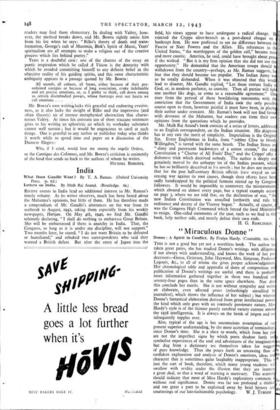India
What Does Gandhi Want ? By T. A. Raman. (Oxford University Press. 35. 6d.)
Letters on India. By MUlk Raj Anand. (Roudedge. 6s.)
RECENT events in India lend an additional interest to Mr. Raman's timely volume. As its writer observes much has been heard about the Mahatma's opinions, but little of tem. He has therefore made a compendium of Mr. Gandhi's utterances on the war from its outbreak to August, 1942, taking them especially from his weekly newspaper, Harijan. On May 4th, 1940, we find Mr. Gandhi solemnly declaring, "I shall do nothing to embarrass Great Britain. She will be embarrassed if there is anarchy in India. That, the Congress, so long as it is under my discipline, will not support." Two months later, he stated, "I do not want Britain to be defeated or humiliated," and rebuked two correspondents who said they wanted a British defeat. But after the entry of japan into the field, his views appear to have undergone a radical change. H rejected the Cripps olive-branch as a post-dated cheque on bankrupt firm. He now professed to see no difference between Fascist or Nazi Powers and the Allies. His references to United States, "the worshippers of the golden calf," became ma and more caustic. America, he said, could have brought about pea if she wished. "But it is my firm opinion that she did not use opportunity." He demanded that the American troops should withdrawn from the country—perhaps as Mr. Raman suggests, fo fear that they should become too popular. The Indian Army wa to be totally disbanded. When it was objected that this wo lead to disaster, Mr. Gandhi replied, "Let them' entrust India t God, or, in modern parlance, to anarchy. Then all parties will figh one another like dogs, or come to a reasonable agreement." On rises from the perusal of these bewildering statements with th conviction that the Government of India took the only possibl course open to them, however painful it must have been, in placin their author under restraint. Mr. Raman's book will not find fay with devotees of the Mahatma, but readers can form their ow opinions from the quotations which he provides.
Mr. Mulk Raj Anand's book consists of a series of letters, addresse to an English correspondent, on the Indian situation. His diagnos has at any rate the merit of simplicity. Imperialism is the Origin Sin. Every Englishman in India, from "robber Clive to blood Willingdon," is tarred with the same brush. The Indian States "slimy and putrescent backwaters of a rotten system," the 193 Constitution a "Charter of All Fools' Day," and the Cripps' offer dishonest trick which deceived nobody. The author is deeply an genuinely moved by the unhappy lot of the Indian peasant, whi he has so brilliantly described in his novels: but he does not menti that for the past half-century British officials have waged an un ceasing war against its root causes, though their efforts have bee sadly handicapped by the political ferment stirred up by Congre followers. It would be impossible to controvert the misstatemen which abound on almost every page, but a typical example oc on page 3, where we are told that, on the declaration of war, " th new Indian Constitution was annulled forthwith and rule b ordinance and decree of the Viceroy began." Actually, of course, was the Congress High Command which forced the local Ministrie to resign. One-sided statements of the case, such as we find in th- book, help neither side, and merely defeat their own ends.
H. G. RAWLINSON.


























 Previous page
Previous page